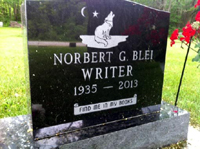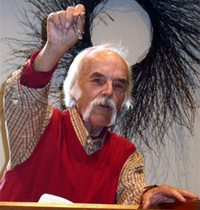
Herbert Zbigniew 1924 – 1998
Poerty Dispatch No. 197 | October 17, 2007
The Eastern European Condition
I don’t know what it is about the work of Eastern European writers that has such a hold on me.. Partly, no doubt, because I grew up in that culture (Slavic), tucked away in a Chicago neighborhood where the language of the home, streets, alleys, shops, taverns, backyards, birth/wedding/burial celebrations was a foreign tongue that crackled in anger and joy, not to mention despair, an unspoken Slavic dialect all of its own. Everything was a secret (including the language if you were taught to speak English) and everything had a compelling darkness to it, even love. The slightest thought of my own past, and all this comes pouring forth again. It’s a rich heritage. An empty cathedral in candlelight. I would not be the writer I am without it, nor continue to explore all the conditions of daily life, human existence, without writers like Zbigniew Herbert who keep turning over the deep dark earth, looking for life. Norbert Blei

A LIFE by Zbigniew Herbert
I was a quiet boy a little sleepy and—amazingly— unlike my peers—who were fond of adventures— I didn’t expect much—didn’t look out the window At school more diligent than able—docile stable
Then a normal life at the level of a regular clerk
up early street tram office again tram home sleep
I truly don’t know why I’m tired uneasy in torment perpetually even now—when I have a right to rest
I know I never rose high—I have no achievements I collected stamps medicinal herbs was O.K. at chess
I went abroad once—on a holiday to the Black Sea in the photo a straw hat tanned face—almost happy
I read what came to hand: about scientific socialism about flights into space and machines that can think and the thing I liked most: books on the life of bees
Like others I wanted to know what I’d be after death whether I’d get a new apartment if life had meaning
And above all how to tell the good from what’s evil to know for sure what is white and what’s all black
Someone recommended a classic work—as he said it changed his life and the lives of millions of others I read it—I didn’t change—and I’m ashamed to admit for the life of me I don’t remember the classic’s name
Maybe I didn’t live but endured—cast against my will
into something hard to govern and impossible to grasp a shadow on a wall
so it was not a life
a life up to the hilt
How could I explain to my wife or to anyone else that I summoned all my strength so as not to commit stupidities cede to insinuation not to fraternize with the strongest
It’s true—I was always pale. Average. At school in the Army in the office at home and at parties
Now I’m in the hospital dying of old age. Here is the same uneasiness and torment. Born a second time perhaps I’d be better.
I wake at night in a sweat. Stare at the ceiling. Silence. And again—one more time—with a bone-weary arm I chase off the bad spirits and summon the good ones.
(Translated, from the Polish, by Alissa Valles.)

A LETTER ON ZBIGNIEW HERBERT FROM WRITER HATTO FISCHER* IN GREECE
Dear Norb,
just a quick response since I knew Zbigniew Herbert personally. Often we would visit him at his house in Warszawa during the dark period of Marshall Law after 1981. He was one of the few persons who had not been arrested. His previous training as lawyer predestined him for two important things: he did not play with politics as he did not play politics and his impartiality made him become the imaginary witness that Adorno spoke about. He was asked to attend trials of other Solidarnosc intellectuals who had been arrested. He was a sort of guarantee for a minimum of a fair trail. His humor was amazing as was his habit of retreating to a monastery for the blind where he loved to write his poetry. His linkage to Greece is expressed in the booklet ‘A Barbarian comes into the Garden’. Two essays in that booklet stand out: his archaeological description of who took what from the Acropolis as souvenir and not only the British; and how different cultures become visible when tourists climb into a boat when the water is still calm and how they are transformed again in a most characteristic way when the waters turn rough. For your information I attach what I had published first on our heritageradio.net
I have followed your debate about the Academics. It reminds me what Rosa Luxembourg shouted at Lenin for changing the concept of the party by inviting in Academics to keep out the opportunists, for Rosa foresaw academics as being, generally speaking, the most opportunistic lot there is. When they need to talk politically, they withdraw to disputes of knowledge and when they should be reasonable in terms of substantial knowledge, they become power politicians. But such generalizations do not help and the relationship to academics will not improve as long as we have no way of keeping alive our poems without them being dissected like frogs on the table of the biologists. ciao Hatto
 *Editor’s Note: Hatto’s poetry appears in the recent Cross+Roads Press book, OTHER VOICES ($17, plus $3 postage and handling…PO Box 33, Ellison Bay, WI 54210 USA). A good man, a good poet, a generous heart, an active, world member of a dying breed we once called humanist.
*Editor’s Note: Hatto’s poetry appears in the recent Cross+Roads Press book, OTHER VOICES ($17, plus $3 postage and handling…PO Box 33, Ellison Bay, WI 54210 USA). A good man, a good poet, a generous heart, an active, world member of a dying breed we once called humanist.



























































Leave a comment